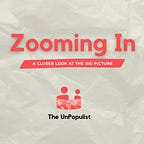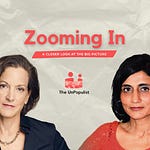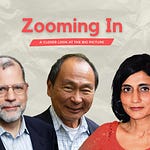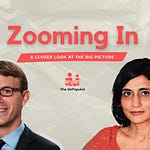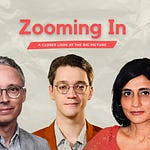Listen to Zooming In at The UnPopulist in your favorite podcast app: Apple Podcasts | Spotify | Google Podcasts | RSS
Aaron Ross Powell: My guest today is Eve Fairbanks, author of The Inheritors: An Intimate Portrait of South Africa’s Racial Reckoning. Our conversation explores the complex history of post-apartheid race relations in South Africa, how it complicates simplistic narratives and what lessons Americans should draw as we seek to address our own country’s racist history.
The following transcript has been lightly edited for flow and clarity.
Aaron Ross Powell: I want to start with a striking line from the excerpt from your book that we published at The UnPopulist. You write, “Over the 12 years I spent there, I found almost nobody in South Africa was having the experience of the post-apartheid country that I imagined they’d be having.” What do you mean by that?
Eve Fairbanks: There were a lot of paradoxes about the aftermath period, after the end of apartheid, which sometimes I feel—not for many people who are extremely well read—we’re a little stuck on in the U.S.: on Mandela, the Truth and Reconciliation Commission, that the story wrapped in this fairly neat way in the ’90s. And I’ll just talk about two examples of that. I found a great number of white South Africans very—like it was almost psychologically impossible to accept that they’d really been forgiven, to believe it, and to not believe that resentment would rise, that at some point, soon or down the line, there would be a kind of more material retribution.
So you had this idea that there was this wonderful situation in which a powerful group, a powerful minority-wielding regime, semivoluntarily gave up power, and that those that they had oppressed chose to live with them together in a kind of multiracial democracy, and to treat them as equals and to not exact any kind of revenge. And to a large degree, that has happened. There hasn’t been a kind of mass land expropriation in South Africa, or other types of retribution that are material against white South Africans in an en masse way. But it’s almost hard for people to live with that reality.
We can talk, if you’re interested, in why I started to believe that is. Because I thought, gosh, people could be living more calmly, or they could just feel better, if they’d believe that their neighbors are well disposed toward them. And they’re very afraid. But what makes that belief sort of satisfying to hold, or necessary to hold?
Then Black South Africans: I think they did not realize—both because it was concealed from them and out of a kind of denial and wishful thinking that many normal people and leaders admitted to me—that they were not coming into a promised land out of 40 years in Sinai suffering, coming into a land where there would be divisions and disagreements within the community, but at least the place would be fertile and a nice kind of starting point. They had effectively won a very dysfunctional state that was on the verge of bankruptcy in the early 1990s. Many, even high up, didn’t know the extent of that. It had a kind of deep-rooted corruption, the bureaucracy.
I make an analogy in the book—I forget if it was in The UnPopulist piece—but it was as if they were kind of being told by History and by the world and by analysts that politically speaking, they had won this great thing, this great prize, this wonderful country that now they were going to get to run, but also they will be tested: It’s going to be a bit scrutinized to see if they were really going to manage it. When in reality, it was like being sold a used car that was right on the verge of just totally breaking. And yet they had suffered so much and paid so much for this vehicle that they had to convince themselves that it really was of great value. You get a lot of, a very striking degree of, quite open self-contempt, and within the Black community in South Africa you’ll hear things like, “I think it’s turned out that maybe Black Africans just can’t run a modern state,” or things that are shocking for an American coming over.
I think part of that is it’s so important to believe that this state could still have a ton of potential, because then if you just got people into power who could do better, it could really fulfill a lot of its people and give them satisfying lives. It’s harder in a way to acknowledge, yeah, we were kind of saddled with this thing that was kind of terrible.
Powell: This almost seems like a perfectly charged situation for the construction and maintenance of self-serving narratives or conflicting narratives. When you talk about the reaction of the white South Africans and this expectation of things—of land expropriations, of just backlash—that didn’t seem to come, and the Black South Africans taking over this thing and not engaging in that kind of activity, how much of that was—let’s start with the white South Africans—a genuine fear? Like, I have a fear that we have perpetuated this tremendous injustice upon another group for decades, a monstrous evil, and it’s perfectly reasonable to think that the people who were the victims of that are going to be pretty mad about it and may act in angry ways, right? So an external fear versus a, “I have tremendous guilt over what I have participated in and so am almost wanting the cathartic cleanse of that backlash”? It’s almost like a level of disappointment that these people aren’t acting in the way that I think they, to some extent, deserve to act towards me.
Fairbanks: The latter sounds very paradoxical, but it totally, totally exists here. There are maybe three types of fear. The first is that people who grew up white in apartheid South Africa were just inundated with—the apartheid state called Black South Africans terrorists. Imagine you are now living in a state run by people that you grew up being taught in school were terrorists. That exists. That’s quite visceral. It doesn’t matter if you’re progressive, that’s a quite deep-seated thing. Then there’s a more logical fear like the one you laid out. It stands to reason that these people would want more out of us, want to take more.
But then the final thing—I noticed it in South African literature written by white South Africans, post-apartheid literature—that there’s a huge theme, there’s often a plot point, three-quarters of the way through the book where a white character is violently dispossessed of stuff. The J.M. Coetzee book famously includes a sexual assault, a seizure of even agency over one’s own body, but there’ll be a home invasion where Black burglars enter your house, and you’re basically being violated. Very often, a theme of these books is a sense of relief the character feels afterward: Finally, the equation has been solved; there’s not these hanging variables. Finally, this thing that I now am just living in fear of, at least it’s just happened, and we have got it over with. And in fact, that probably, honestly, is what we deserved.
I’ll just say lastly, there are two people who were not—who were real people who talked to me at great length, one of them about the feeling of burden of being forgiven. He experienced Black forgiveness or politeness toward him or leaving him alone in his house as a subtle way of proving that they were better than whites, because while white people when they were in power had violently dispossessed Black people, forced relocations, forced segregation, took property, took land, “We won’t do that. We will rise above. We’re better than you.”
Now, you could say that’s a sour way of thinking about what they did, but he experienced forgiveness as burdensome, and that he actually would rather be attacked. He began to look for examples of Black people who seemed to be ill-disposed toward him and attacking him in meetings. He was really looking for those, in a sense.
I also do think even progressive white South Africans—of which there were a number, a flourishing community under apartheid; they were part of the anti-apartheid movement, often at great cost to themselves—part of their story was that this was about power, and that white people had too much power, and then went, “This is just what happens.” This is the way that they behaved: the fear of the other, the dispossession. And if the next group to gain power does not act in the same ways or acts very differently, especially toward you, it makes you look worse in retrospect. It rewrites and recasts your own past in a more negative light.
I think people really struggle with that. Somebody told me point blank that he and his wife just wished that Black South Africans would get it over with, by which he meant creating a more materially equal society. They were living in this kind of manse that they’d fortified in the capital with lasers and spikes on the walls, and it’s a four-bedroom house, and they had their cars inside, and they’d done a lot of work, and they’d invested a lot into protecting their property and their position. He said: “My wife in particular would never ever admit that we feel at all uncomfortable about what we have. We’re in our 30s. We can tell a story about how we, too, grew up after apartheid. We earned this. But for me, honestly, I’m so uncomfortable, I’m so unhappy in a way, that I just wish the leveling would just be gotten over with.”
I thought it was really fascinating. It’s something that has the potential to explain some types of reactions, I think. Also, I was always looking, in the excerpt that you published and the book itself, to talk even at length with friends that I made and try to draw out layers of feelings behind, in some cases, a more simplistic, superficial, “I’m a white South African, and I now feel that it’s reverse apartheid, and I’m oppressed.” There were a lot of people that were too smart to have that be their only belief.
Powell: On the other side of things, was the lack of widespread retribution, the “getting it over with,” on the part of the Black South Africans—which again, most of us would think would’ve been a reasonable response, or at least an understandable response—was the lack of that coming from this moral high ground position, as you’ve said some of the white South Africans believed it was? Or was it more of a tactical, strategic choice where we’ve been handed this, as you called it, this used car that’s barely holding together, and engaging in that kind of behavior, even if we want to do it, is just going to make things worse: We’re going to throw a wrench into an already barely functioning car, so we’re going to hold off because of that.
Fairbanks: I think there’s a lot of the latter. I think there’s the feeling like you’re driving a thing where the door is taped on and one family member’s holding one door on and another’s got a hand into the wheel well, and if one person moves in any direction, the whole thing will just come apart. There is that fear and that strategic feeling. There’s a guy named Tokyo Sexwale, who was a big anti-apartheid activist in the ’80s, and who became an African National Congress leader. He famously kind of begged white South Africans not to leave in the late ’90s. He said: “You know when we’ll become a Banana Republic is when you go. Please don’t leave.”
There were a lot of—I don’t want to say even chits thrown—but just on the political side from the government itself, a lot of strategy and tactics around, “They still hold most of the capital, and the country will become much poorer if we don’t make it seem like a place where they can live and flourish.” I also found there was a level of self-policing and wanting to sustain—one of the interesting things about the post-apartheid period in South Africa is seeing a group of people that really only had an identity ever through a shared experience of resistance to oppression and being in a, not a victim mode, but of resisting oppression from below, because there was no such thing as a Black South African before the white regime categorized them that way in laws that dispossessed them. So that whole nation or that identity group only exists for that. To see a group like that grappling with how to deal with having power is really fascinating. You find a discomfort in giving up what had grounded an identity, and a self-policing.
So every so often here, you’ll get some incident. One in particular—there was a real estate agent, who was very well known, who posted a very racist, just really outrageous “monkey”-laden screed on Facebook. She was stripped of her license; she was actually charged with something, but there was a lot of self-policing among Black South Africans to not be horribly rude to her, because: “That’s what they do. That’s what they did. We’re better than that. We’re more complex, we’re more humane. We don’t make fun in that way.”
But finally, the level of internalized racism that persists here is quite extreme—the kind of honor that’s afforded at baseline to white South Africans by Black South Africans. There was a little story of a white Afrikaner guy who moved to a township for a month and blogged about it. One of the interesting things in his blog was that he really struggled to get to work at his investment bank in a very rich suburb of Johannesburg because the apartheid state had never built transit connections between these poor Black neighborhoods and an investment bank—there are ones, but that janitors use, and that are really, really, really crappy. He was really surprised that his Black neighbors felt so sad for him that he had to use this crappy mass transit. Black people had been using that for ages, but there was something that to them felt very pathetic and pitiable; they felt pity that a white man who should be in a nice decent car had to be—it sounds strange, but he said they would say, “Mlungu,” which is white person, “it’s such a shame. We’re really sorry.” And this is quite sincere—you shouldn’t have to suffer like that.
There’s something quite touching about that, but it also comes from a dark source, which is a whole lot of ideas about who deserves to be sitting in a nice car. I think that all of that is in play.
Powell: Obviously, 1994 and earlier, it was an explicitly racist regime and country. How has racism shifted within the country in the years since? Are racial attitudes getting better, or are they evolving? There’s a story in the excerpt about a farmer who mentions being worried about how racist his son appears to be, and he explicitly expresses worry that the younger generation seems to be backtracking. Is that a widespread problem?
Fairbanks: It’s interesting because it’s possible to see it from two angles. If you think of racism as a statue, you can look from the back, and you can look from the front. I’ll go to my husband’s workplace, where he has Black colleagues, and he’s actually a service provider, prints photographs for Black artists. There’s a relationship that would not really have existed under apartheid at all, where you have a white service provider to Black clients. If you look at even photographs from the late 1980s and you think about how really recent that is—it is just incredible montages, incredible realities in some ways, how much the society was able to leave behind. In 1986, you were not permitted legally to have sex with a person of another race. Now you have all kinds of interracial marriages and beloved Black figures like the captain of the South African national rugby team, who’s been entirely accepted by these thick country hick types—proud, and they love him.
The other side is things that are complex, and they come up in surprising ways. There’s a lot of incidents here—many, many, many incidents, increasing number—of police brutality, and the officers will almost always be Black. However, these incidents will bear a resemblance that’s undeniable to people who grew up here to police brutality under apartheid, but the perpetrators are now Black. Almost everyone here would feel somehow there’s ideas about how you treat a Black suspect or a poor Black suspect that have carried over, even if the perpetrator is of a different color.
It starts to get more complicated in that way, and I think among whites, among young white South Africans, there is a group that has found it—they’ve embraced the idea, oddly enough, of their own oppression and victimhood. There’s this sense that an oppressed people triumphed in South Africa, and that in some way, the moral context of the country is positive around giving more rights to those who are oppressed. And so there’s this whole discourse of, like, “canceled” and “oppressed” young white people that has become very hip in a way that has some—I don’t know, when I come back to the U.S. (I live in South Africa, but I spend two or three months in the U.S. every year), there’s something also in the U.S. that reminds me of that: this slight Andrew Tate, like you’re very good with TikTok, but you also say that you’re a profoundly oppressed and canceled white person. These things are shape-shifting in really interesting ways. They don’t die easy.
Powell: I want to pick up on that in the minutes that we have left, because as I was reading your article, the parallels to a lot of the ways that racial and racist culture and politics, sociology, within the U.S. seems to be playing out was striking. At one point, you mentioned that South Africa plays, in a lot of people’s minds, this, what you called, “instructive and archetypal” role as an instance of this caste system being overthrown and how it plays out.
To some extent, what you’re doing is complicating the archetypally instructive nature that people imagine it to have. So looking at the United States, what lessons should we on this side of the pond draw from the South African experience, particularly the more complicated version of it that you present?
Fairbanks: I see in a lot of conversations in the U.S. the implication—it’s not always explicitly stated—but the implication that demographic change is in institutions. Let’s posit that your goal is a nonracist society, or one that’s more equitable or free or whatever. You would at least want maybe a proportional demographics, or you’d look at making sure that institutions reflect their communities.
I think a big lesson of South Africa is that that really is not an end point. South African government now entirely reflects the demographics on a provincial level and nationally, and the people who are in power look like the ordinary voter. And it constantly finds itself, sometimes without even really meaning to, replicating or recapitulating kind of apartheid-era type behaviors, so that’s a huge lesson.
And also, when people’s position within a society changes, I think they don’t feel the same way as they did when they were in the previous position. Now I know what I just said sounds totally obvious, and yet I think it’s hard for us to fully accept. If America had a Supreme Court with six people of color, or if white Americans of a certain type—women—end up feeling like they’re declining economically or just squeezed in various ways, the idea that they’ll carry with them the feelings that they just had due to their identifying label, and the feelings and the goals and the ideas that they have about how to change society or whatever: People really don’t. Their ambitions shift as their demographic and social position shifts, and I think South Africa shows that in really, really, really complex ways.
But one of the things that—just as the last point—that I learned in South Africa again and again was how much I myself underestimated how little demographic change really alters things in the way I would’ve expected, and how much it does in other ways. I just realized how many assumptions that I hadn’t even grappled with, that I carried with me, about what will happen when, for example, this is the student body or—people can have both fears about that and anticipation, and it doesn’t turn out how you expect at all when you have this type of almost power reversal.
© The UnPopulist, 2023
Follow us on Bluesky, Threads, YouTube, TikTok, Facebook, Instagram, and X.
We welcome your reactions and replies. Please adhere to our comments policy.


